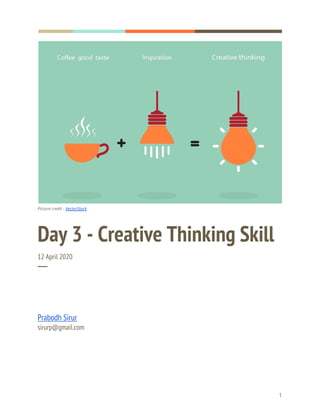
Day 3 creative thinking skill
- 1. Picture credit - VectorStock Day 3 - Creative Thinking Skill 12 April 2020 ─ Prabodh Sirur sirurp@gmail.com 1
- 2. 2 What is Creative Thinking Skill? Creative thinking is the ability to look at things differently, and find new ways of solving problems How to improve Creative Thinking Skill? Set a goal to become a go-to person by mastering the art and science of Creative Thinking. Follow the LAST model to build your personal brand as a Guru of Creative Thinking. 1. Learn - Invest time in learning different models/ techniques of Creative Thinking 2. Apply - a. Identify a model suitable to you b. Create a template to document the flow of the process c. Find opportunities to use the selected method/ template d. Maintain record/ process flow of every Creative Thinking exercise you did e. Maintain notes of your thoughts/ insights/ failures/ challenges…. to be used for sharing/ training others 3. Share - Share the insights captured in step 2 above in a planned manner (social media posts, blogs, videos, study notes…) 4. Train - Generate opportunities to train your peers and team members so that, over time, your organization benefits from your efforts 2
- 3. 3 My learning for the day Source - 8 creative thinking techniques and tools Author - Harry Gardiner The essence of creative thinking is - Think of every idea that comes in your mind, even if it is too far-fetched. List all these down and conduct a critical selection process later; the more you jot down, the bigger is the chance of finding that golden ticket idea. Do we know these techniques and tools & have we practiced them ever? Mind mapping (also known as brainstorming or spider diagrams) - This is a graphical way to represent ideas and concepts. It is a visual thinking tool. Thanks The checklist - Ask these questions before starting your work. The answers could ignite some creative thoughts (‘Why?, Where?, When?, Who?, What? How?’ is the best way to start). Thanks Sergey. Six Thinking Hats - Tool created by Edward de Bono. This tool is generally used for group creative thinking. Why not try them out to build your thinking muscle? Each of these six hats will open up different thinking directions in you (White Hat – Facts, Red Hat – Emotions, Black Hat – Judgement, Caution, Yellow Hat – Logic, Green Hat – Creativity, Blue Hat – Control). Thanks Edward Picture Association - Choose any picture. Create an imaginary story around it. This practice will help you build your creativity muscle. Use it even when you want to destress yourself. Thanks James Neale. Random Word Generation - This is a fun way when building creative content. Simply pick two random words and try and tie your content to it in the most imaginative way possible. Thanks Ryan Chadwick. Other people’s view - Talk about your idea with others. Some new ideas will come up from such conversations Get Up and Go Out - Do a 5 senses walk; Feel the air, touch the leaves.. (skin), look around everything with curiosity (eyes), listen to all sounds around you (ears), smell the surroundings, smell a flower, if you are not allergic (nose), pluck a cherry, if possible (tongue). Some magic may happen 3
- 4. 4 Purpose of this document I took a 66 day challenge to study Life Skills last year (10 April 2019). To my astonishment, I succeeded in studying for 66 days one skill a day. My objectives of learning these skills were - To strengthen my mind to face life’s challenges with ease, To use these skills in my worklife for a better performance, To use these skills in my personal life for enriching my relationships, To open new possibilities to surprise myself. This is my next 66 day challenge (from 10 April 2020) - To share my Life Skills learning with my social media friends. I pray that my toil helps you in your success journey. What are Life Skills? UNICEF defines Life skills as - psychosocial abilities for adaptive and positive behaviour that enable individuals to deal effectively with the demands and challenges of everyday life. They are loosely grouped into three broad categories of skills - cognitive skills for analyzing and using information, - personal skills for developing personal agency and managing oneself, - inter-personal skills for communicating and interacting effectively with others. Which LifeSkills are covered? The World Health Organisation identified these basic areas of life skills that are relevant across cultures: 1. Decision-making 2. Problem-solving 3. Creative thinking 4. Critical thinking 5. Communication 6. Interpersonal skills 7. Self-awareness 8. Empathy 9. Coping with emotions 10. Coping with stress. 4
- 5. 5 Some trivia ‘Life skills’ was never part of the school curriculum. WHO/ UNESCO mandated academia to teach these skills in all schools across the globe in 1993. Different countries educate their children in these skills with different objectives - Zimbabwe and Thailand - prevention of HIV/AIDS - Mexico - prevention of adolescent pregnancy - United Kingdom - child abuse prevention - USA - prevention of substance abuse and violence - South Africa and Colombia - positive socialization of children. 5
